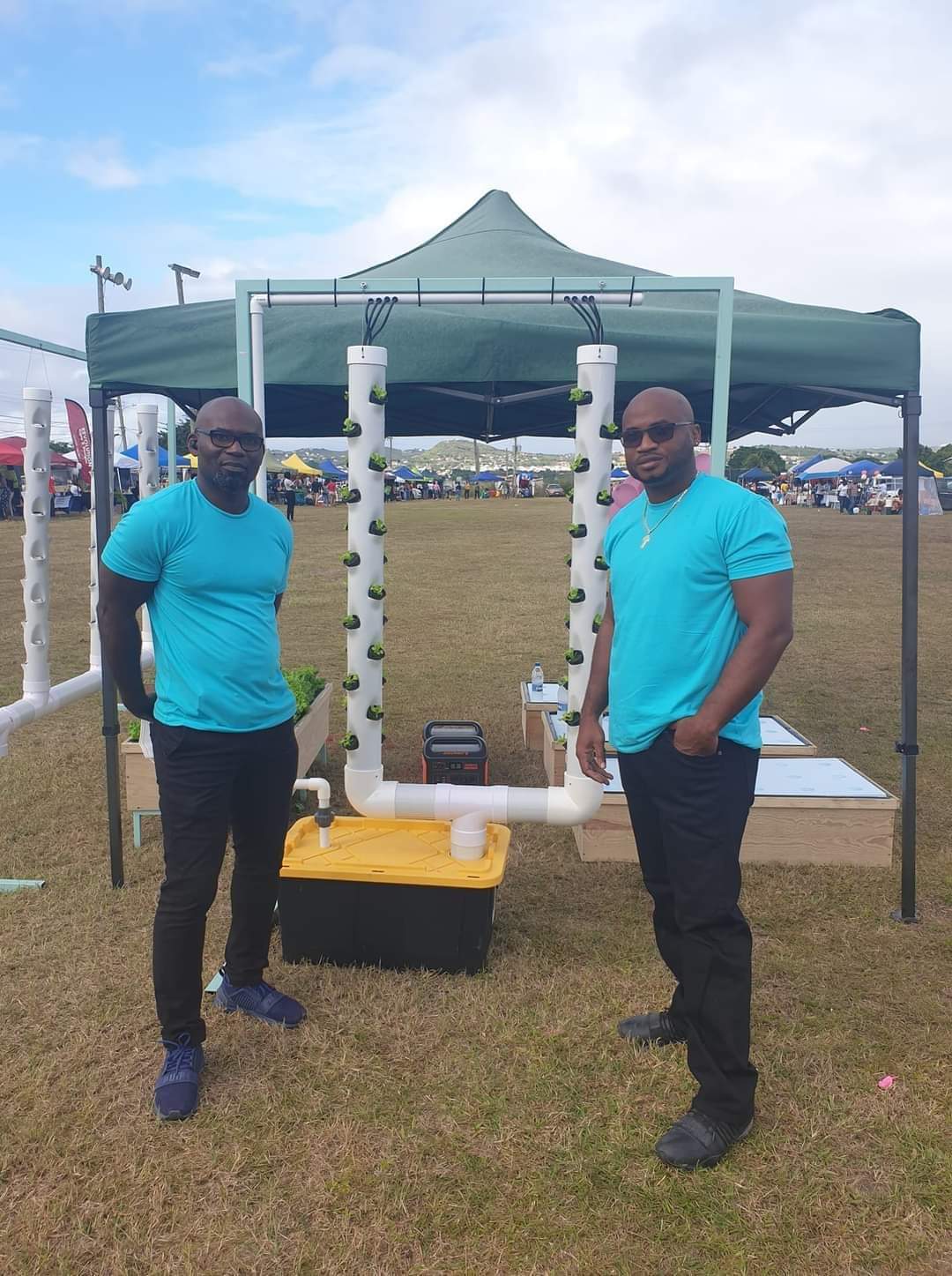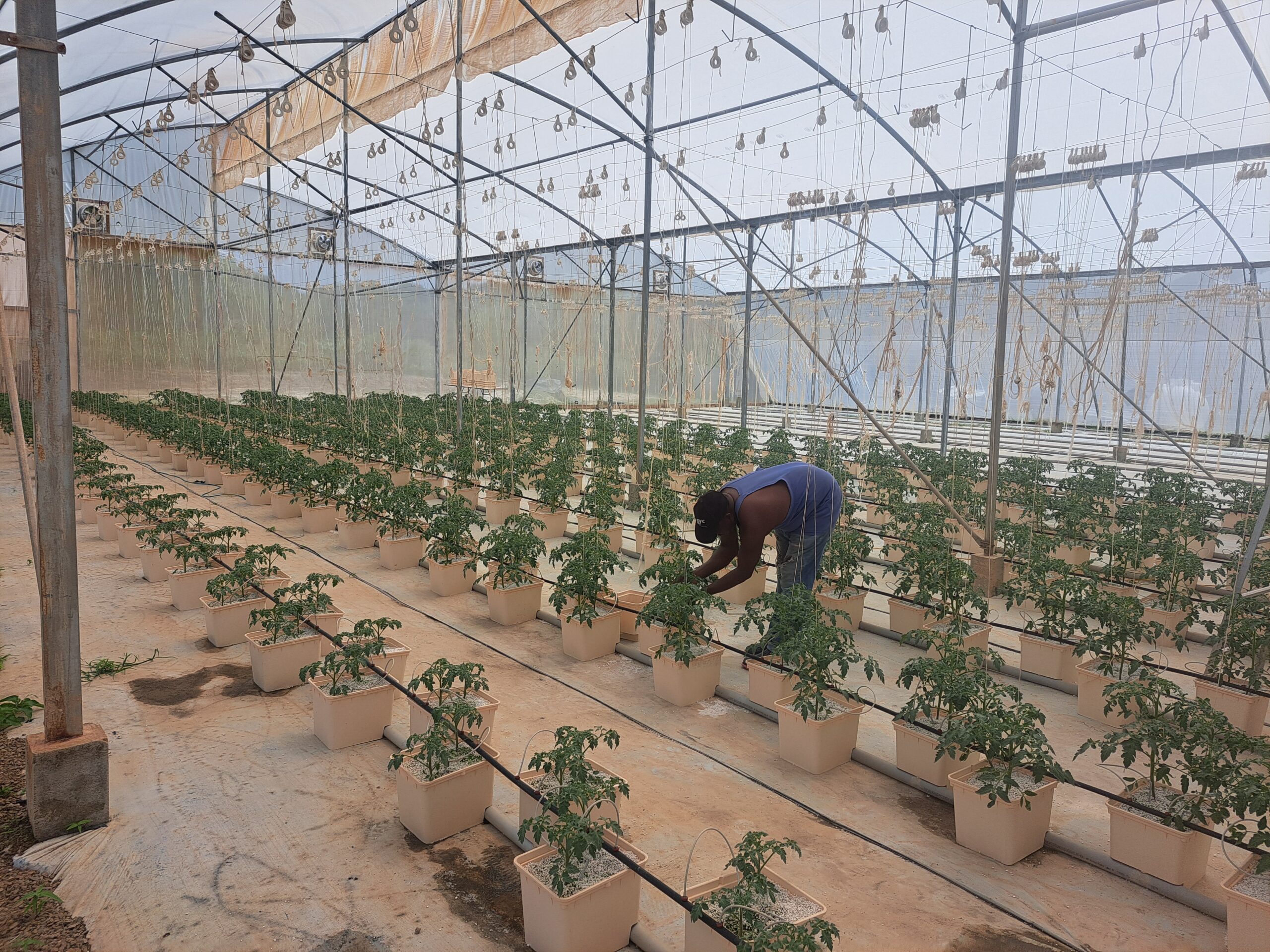
16 May Endless Possibilities with Alternative Farming: Aquatic Solutions, Antigua and Barbuda
Two entrepreneurs and farmers in Antigua and Barbuda are propelling fellow farmers and householders into the world of aquaponics, hydroponics, and protected agriculture through their venture Aquatic Solutions. Alfred Brazier and Wayne Gardener formed the company in 2022, and strongly believe it has a critical role in food security, especially as climate change continues to impact crop production in the twin island state.
“We need to have a mind shift because what we’re doing in traditional farming is not fitting our context because each year [the] growing cycle is getting shorter and shorter. In 2020, traditional farmers were able to plant lettuce in September. In 2021 they planted in November. In 2022 lettuce didn’t come to market until the week of the 19th in December. Clearly you can see we have to move away from that…”, says Alfred.
Acknowledging that some farmers may want to continue using conventional soil-based methods, he suggests using protected agricultural practices like growing in greenhouses and soil-less techniques like aquaponics and hydroponics as complementary approaches. By doing so, “When the field is not producing, you can produce in your protected areas,” he explained.
Addressing water scarcity and food prices
According to the United Nations, “Antigua and Barbuda ranks as one of the most water-stressed countries in the Caribbean…Climate change is expected to bring a decrease in water availability and a greater vulnerability for water resource management.”
Wayne indicated that one of Aquatic Solutions’ largest clients, who farms over 40 acres of land, has already scaled down conventional production because water shortages have become the norm. This client has hired Aquatic Solutions to set up a greenhouse, a move which he no longer sees as optional but necessary to help him transform his business and maintain income from certain types of produce, especially during the summer months.
Wayne also noted that many householders are finding the price of their preferred types of nutritious food too high in the supermarkets. Those who’ve engaged Aquatic Solutions are building systems to grow the produce they want and avoid the rising prices.

Compelled to start
Gardener and Brazier were not always into agriculture. In Brazier’s case he credits his wife Sherry-Ann with the start of Shaade Hydroponics. She started exploring hydroponics first through a course she was taking at the Gilbert Agricultural and Rural Development (GARD) Centre. He would find her absorbed in the learning materials, became curious about what could be so fascinating and began reading them, becoming equally immersed. Eventually, the former head of operations and manufacturing specialist, offered to build his wife a system as a Christmas gift.
During the build, a mutual friend introduced Alfred to Wayne and the two became fast friends. Wayne was instrumental in advising Alfred as he set up his system, and Shaade Hydroponics is now a family-owned and operated business producing 1200 heads of lettuce weekly along with arugula, kale, mint, parsley and chives. Brazier eventually entered the business full-time.
Since 2015, Gardener, a seasoned entrepreneur, had already been running his commercial aquaponics venture, Lincoln Farms, was named after his late father. He had previously run retail and trucking businesses among others, but had witnessed his father, a fisherman, start a conventional farm to supplement income.
However, his mother endured financial challenges with the farm after his father’s passing and Wayne wanted to make things better. He first considered poultry farming but after more exploration, decided on aquaponics which he described as a “cleaner” type of farming and more humane. It also incorporated elements of the fishing and crop farming his late father had pursued.
Gardener constructed a self-made commercial-size unit but later travelled to the USA to learn how to build these systems better and became certified in aquaponics farming. Lincoln Farms now produces about 6000 pounds of fish and 3300 heads of lettuce weekly along with basil, mint and arugula. A new automated greenhouse is also scheduled to operate on the farm.

The future of agriculture and food security
Aquatic Solutions became the pair’s answer to helping others in Antigua and Barbuda replicate their success after receiving many queries about how to build these systems. Now there is also interest from farmers in other islands. The two have also set up a third farm producing about 2000 pounds of tomatoes weekly.
Gardener reiterates that, “I think that we’re really contributing to food security, not just what we are producing but by extension what the persons that we’ve built these systems for are doing with them.”
Summarising the value of what the pair is doing, Sherry-Ann said that, “What they teach in school is more of the traditional means of farming and that’s not something that is attractive to me [or] attractive to the younger generation. So, we see hydroponics, aquaponics as the future of agriculture and I think if we shift focus into teaching other women, teaching the younger generation this method, the future can only be great, it can only be green. There is so much potential, so [many] opportunities to be self-sufficient…the possibilities are endless.”

